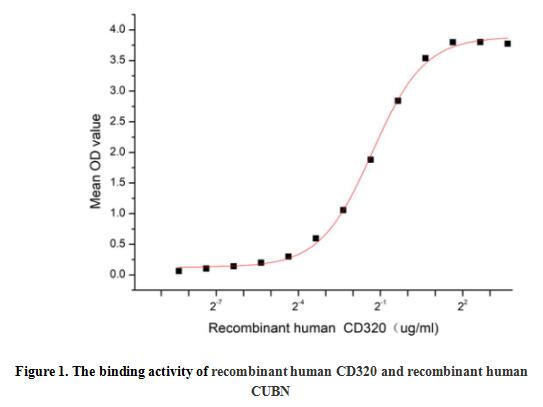Active Cluster Of Differentiation 320 (CD320)
8D6; 8D6A; CD320 Antigen; TCblR; FDC-signaling molecule 8D6; Transcobalamin receptor
- Product No.UAPB007Hu01
- Organism SpeciesHomo sapiens (Human) Same name, Different species.
- Buffer FormulationPBS, pH7.4, containing 0.01% SKL, 5% Trehalose.
- TraitsFreeze-dried powder
- Purity> 90%
- Isoelectric Point4.1
- ApplicationsCell culture; Activity Assays.
- Download Instruction Manual
- UOM 10µg50µg 200µg 1mg 5mg
-
FOB
US$ 93
For more details, please contact local distributors!US$ 233
For more details, please contact local distributors! US$ 465
For more details, please contact local distributors! US$ 1395
For more details, please contact local distributors! US$ 3488
For more details, please contact local distributors!
ACTIVITY TEST of the Active Cluster Of Differentiation 320 (CD320)

CD320, also known as the Transcobalamin II receptor (TCb1R) and 8D6A, is an approximately 60 kDa transmembrane member of the LDL receptor family. CD320 is expressed in virtually all tissues and is tightly regulated according to the proliferative/differentiation status of the cell and the cellular levels of B12. Cellular uptake of vitamin B12 (cobalamin) requires capture of transcobalamin (TC) from the plasma by CD320. Cubilin (CUBN) is the intrinsic factor-vitamin B12 receptor, thus a functional binding ELISA assay was conducted to detect the interaction of recombinant human CD320 and recombinant human CUBN. Briefly, biotin-linked CD320 were diluted serially in PBS, with 0.01% BSA (pH 7.4). Duplicate samples of 100 μl were then transferred to CUBN-coated microtiter wells and incubated for 1h at 37℃. Wells were washed with PBST 3 times and incubation with Streptavidin-HRP for 30min, then wells were aspirated and washed 5 times. With the addition of substrate solution, wells were incubated 15-25 minutes at 37℃. Finally, add 50 µl stop solution to the wells and read at 450 nm immediately. The binding activity of recombinant human CD320 and recombinant human CUBN was shown in Figure 1, the EC50 for this effect is 0.4 ug/mL.
USAGE of the Active Cluster Of Differentiation 320 (CD320)
Reconstitute in 10mM PBS (pH7.4) to a concentration of 0.1-1.0 mg/mL. Do not vortex.
STORAGE of the Active Cluster Of Differentiation 320 (CD320)
Avoid repeated freeze/thaw cycles. Store at 2-8°C for one month. Aliquot and store at -80°C for 12 months.
STABILITY of the Active Cluster Of Differentiation 320 (CD320)
The thermal stability is described by the loss rate. The loss rate was determined by accelerated thermal degradation test, that is, incubate the protein at 37°C for 48h, and no obvious degradation and precipitation were observed. The loss rate is less than 5% within the expiration date under appropriate storage condition.
INCREMENT SERVICES
BCA Protein Quantification Kit
Molecular Mass Marker for Protein
Monoclonal Antibody Customized Service
Polyclonal Antibody Customized Service
Protein Activity Test Experiment Service
Electrophoretic Mobility Shift Assay (EMSA) Experiment Service
Buffer
Lentivirus Packaging Experiment Service
Adenovirus Packaging Experiment Service
Real Time PCR Experimental Service
Spike RBD Protein (S-RBD)
Protein G
Protein A
Related products
| Catalog No. | Organism species: Homo sapiens (Human) | Applications (RESEARCH USE ONLY!) |
| URPB007Hu01 | Recombinant Cluster Of Differentiation 320 (CD320) | Positive Control; Immunogen; SDS-PAGE; WB. |
| UAPB007Hu01 | Active Cluster Of Differentiation 320 (CD320) | Cell culture; Activity Assays. |
| UCPB007Hu21 | OVA Conjugated Cluster Of Differentiation 320 (CD320) | Immunogen; SDS-PAGE; WB. |



